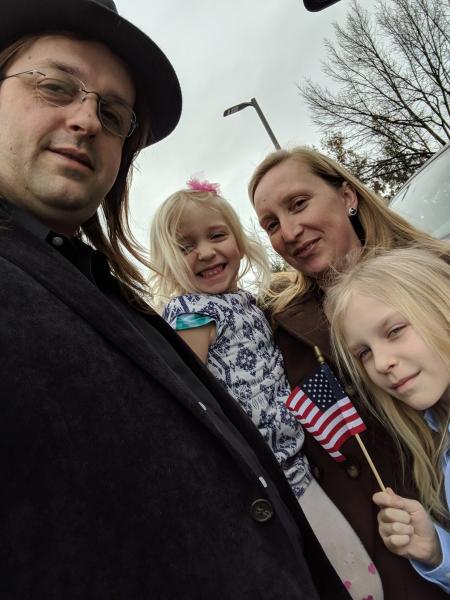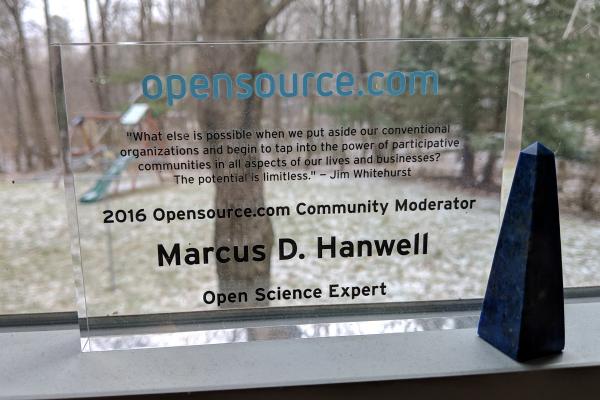My last post wasn’t the most positive. While it was pretty accurate I think it is worth looking back on the good stuff, and hope for the next year. I had the opportunity to be a part of the opensource.com moderator team in the early years of the program, serving as their “open science expert”, and also received a blue obelisk from Peter Murray-Rust himself for my service to the open chemistry community. These experiences both had enormous influences on me, and in both cases afforded me the opportunity to work with amazing people on things I am passionate about. There are many others who have helped me, inspired me, and encouraged me along the way, but I found these items in a box as I was moving stuff between offices.
Receiving recognition for work we do can be enormously satisfying, and it can help you focus on what is important to you. I was sad to leave the opensource.com moderator program last year, and the Blue Obelisk is less active than it once was but the influence of both persists. The awards serve as reminders of what drives me, and where my passions lie. As I completed my PhD, and did a Google Summer of Code I had no idea that my passions could constitute a career. Over those years I have evolved, learned from, and been inspired by those around me. It has been enormously rewarding to work with great people, and I hope that I have also been able to inspire others.
At my core I still have some of the same basic drivers - a desire to further human understanding of the world around us through the development of software capable of interacting with complex data to aid understanding. I came into science quite naive, and assumed that scientists shared all their data, repeated experiments, made sure others could, and offered unfettered access to the results of their government funded research. Lots of other people assume the same, the TEDx talk I gave (shown above) from 2013 summarizes most of my thoughts, and it was a great experience to prepare for/give that talk.
As my research career progressed it became clear that software was quickly becoming a huge driver of research, but the culture of scientific software was one of black boxes, closed sources, and at times barely working code that wasn’t fit for purpose. This irritated me no end, and at that point I began to try and fix it. I have no idea where I will end up, or if I will accomplish as much as I want to, but I continue to love the challenge. Upon leaving academia I also discovered that the publication of scientific research was hugely broken, all of that “free” publication was hidden costs hiding away so much publicly funded research behind paywalls often invisible from within the system.
I think it is essential that researchers don’t become users of software, they need to be empowered by open platforms that the can extend and modify. Science was built upon the principles of “trust, but verify”, and that is not possible when data, code, analysis, and results are not shared openly. You can have trade secrets, NDAs, proprietary code, and reap the financial rewards of exploiting your discoveries but you can’t have it both ways. If you claim to have made scientific discoveries I expect to be able to trust you, but I also want the ability to verify your results.
I have spent years developing software to enable verification, to offer transparent data processing pipelines, and to work within other platforms that share these goals. I give up evenings and weekends if I have to in order to continue pushing forward, and go into 2019 determined to continue making progress. I am inspired by the wider community as they push to recognize the importance of software in scientific research, and help wherever I can as none of us can do this alone.
Thinking back to that PhD student, using a proprietary molecular editor with a single seat license, and realizing that I could not make one small tweak to show what I wanted to in a figure. Even if I could I certainly could not share that with the wider community. This is what opened up Pandora’s box for me, and led me into a career developing open software for science.
My thinking has evolved, beginning with a copyleft/GPL take, but over the years realizing that to be truly open you must be able to do as you please with no strings attached. The complication of compliance with copyleft/share-alike type clauses is too great, and I think tough to use in science. Making up your own licenses, or proprietary licenses, or code upon request is far worse don’t get me wrong. I think the MIT/BSD software licenses are ideal, and couple well with CC0/CC-BY for data, publications, etc. I do my best to ensure all my work is able to use these extremely permissive licenses so that anyone can use them for whatever they want.
The need to ask permission impedes progress, and it is becoming clear that we don’t have the time to wait on others. Science has always been about “standing on the shoulders of giants”, I don’t ever remember it saying unless there is a license compatibility issue, or a compliance problem necessitating a rewrite of the relativity module. Making things build on supercomputers, ensuring the interfaces work together, finding funding to develop code, getting allocations, publishing data in a reproducible fashion, indexing that data, and much more are already challenging enough without getting into complex licensing issues!

This has been a stream of consciousness brought to you fresh from my mind ;-) I will work on structuring more next year, but suffice to say despite my negativity on 2018 there were some great spots. My wife and I became US citizens after having lived here for eleven years, we went on vacation, our daughter started school, I saw Metallica live (absolutely amazing), leased a new car, enjoyed another year riding my Honda CBR650F, traveled the country, and enjoyed the company of good friends. I also had several big projects funded, we had some great successes in executing, got funding for a number of commercial applications of my work (much of which I can’t yet talk about, but some really awesome stuff), and we will be getting some shiny new garage doors in the new year!
Enjoying finishing up some code on New Year’s Eve after digging myself out of a motivational hole! Hoping to get out in the new year energized, and ready to do some amazing stuff. Try to find your passions, don’t let people get in your way, but try to help them achieve their goals if you can too. Surround yourself with good people who inspire, challenge, teach, motivate and encourage you! Recognize failures, learn from them, but try not to dwell on them for too long.
Happy new year!
